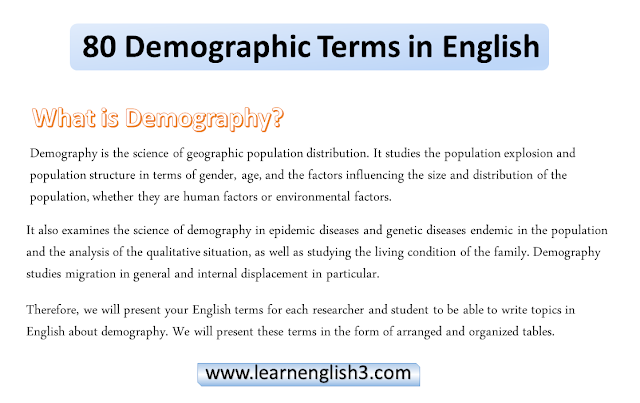80 Demographic Terms in English
Demography is a science concerned with the study of population structure and the study of the phenomenon of overpopulation in certain regions and lack of population in other regions.
Demography terminology in English is of interest to every student of demography and contains many words that will help you in studying or researching and also in writing topics in English. It will be presented in the form of simple tables to make it easier for you to read and memorize, and you can use it whenever you want.
What is Demography?
Demography is the science of geographic population distribution. It studies the population explosion and population structure in terms of gender, age, and the factors influencing the size and distribution of the population, whether they are human factors or environmental factors.
It also examines the science of demography in epidemic diseases and genetic diseases endemic in the population and the analysis of the qualitative situation, as well as studying the living condition of the family. Demography studies migration in general and internal displacement in particular.
Therefore, we will present your English terms for each researcher and student to be able to write topics in English about demography. We will present these terms in the form of arranged and organized tables.
- Infectious Diseases: Through the air
- Contagious Diseases
- Communicable Diseases
- Human Cloning
- Contraceptives
- Application Methods: Methods of using contraceptive methods
- Contraception
- Population
- Family Planning
- Birth-Control: Control the number of births
- Fertility Regulation
- Child mortality rate
- Stationary population: Population in a steady state
- Gender awareness: The quality of the two types
- Gender Analysis
- Gender Asymmetry
- Gender-based division of labor
- Polygamy
- Polyandry: Polyandry for one wife / Polygamy for one husband
- Monogamy
- Reproductive health
- Abortion
- Miscarriage: Unintentional abortion
- Po-life: Anti-abortion
- Pro-Choice: Abortion Freedom Advocacy
- Multi Para: Multiple childbirth woman
- Prime-gravid: Download for the first time
- Embryo: Embryo in the first stage
- Fetus: The fetus in its last stages
- Infant: The child after birth
- Female infanticide
- Feticide
- Premature birth
- Birth at term
- Birth Spacing
- Birth Intervals
- Biological Parents
- Foster Parents
- Foster Care: Orphan sponsorship
- Childbearing age
- Baby boom
- Prenatal care
- Post-natal care
- Postnatal depression
- Delivery
- Confinement
- Circumcision
- Household: Family sector
- Breadwinner Family
- Dependent
- To support/ sustain
- Conjugal family: A married family – a family without children
- Child abuse
- Child battering
- Battered wives
- Immigration
- Immigrant: One migration – external
- Migration in general
- Emigration: Displacement—internal migration
- Emigrant
- Demography / the science of geographical distribution of population Demography
- Population explosion
- Population density
- Overpopulation
- Underpopulation
- Depopulation Decreasing Population
- Population structure
- Gender structure
- Age structure
- Reproduction
- Factors affecting the volume and distribution of the population
- Natural Factors
- Man-made Factors
- Epidemic Diseases
- Genetic Diseases
- Deficiency Diseases
- Venereal Diseases
- Cardio-vascular diseases
- Endemic Diseases
- Chronic Diseases

